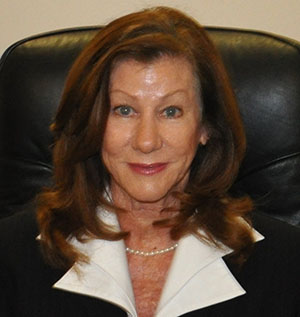Former Royal Palm Beach Councilwoman Martha Webster declared her candidacy last week for mayor, setting up what now is a three-way race for the post.
Candidates have until mid-February to qualify for the March 11 ballot. Incumbent Mayor Matty Mattioli and community activist Felicia Matula, an alternate on the Royal Palm Beach Planning & Zoning Commission, have also declared plans to run.
“I think that the time has come for the Village of Royal Palm Beach to have some civil and strong leadership that has been lacking the last two years,” Webster said. “I supported Matty in his first run, and even went ahead with his second, based on all of the dedicated service he has given to the village, but I think that the village deserves better than what it has gotten from Matty.”
Webster briefly considered a run for Palm Beach County Commission before dropping out and endorsing Kathy Foster’s bid to replace term-limited Commissioner Jess Santamaria. She served on the council for 5 years before being unseated last March by Councilman David Swift.
During Webster’s final two years in office, she clashed several times with Mattioli over how he conducts meetings.
Matula, who has not held public office, ran unsuccessfully against Mattioli in 2012.
“I believe that in 2012, he had a race against someone who had no experience, and voters said, ‘No, that was not acceptable.’ I think that my coming into the race gives the voters the option of someone with experience and demonstrated commitment to the community,” Webster said.
While in office, Webster served as vice mayor in 2010 and was active with the Palm Beach County League of Cities, the Treasure Coast Regional Planning Council and the Metropolitan Planning Organization.
On the council, Webster said she was a strong advocate for fiscal restraint, active in updating code ordinances, championing improved roads and supporting small businesses. She also headed a special task force comprised of residents to find an appropriate use for the old wastewater treatment plant after residents rejected an employment center there.
During the 2013 campaign, Swift characterized Webster as a divisive force on the council, based largely on an attempt she made to reconfigure the Planning & Zoning Commission that drew opposition from other council members. He also focused on Webster’s alleged support of commercial uses at the treatment plant, which Webster said was a mischaracterization of her opinion by Swift and his supporters.
“They were false statements, and they knew they were false statements,” Webster said. “Those statements that were made about the commercial were totally wrong.”
Webster pointed out that there was no public forum in the last election where those issues could be aired. She said she is happy that the Town-Crier has been selected by the village to conduct a public forum.
“Those are the places where the voters have the opportunity to hear from the candidates directly, not just listen to stories that are propagated by the opposition,” she said. “There are people who will say whatever is needed to get where they want to go.”
Webster’s goals if elected include bringing back civil leadership where the mayor allows for constructive discussion from the public, from petitioners and among council members. “We just need some management leadership up there on the dais,” she said. “I think that’s first and foremost.”
She said the council also needs to be looking at infrastructure and quality of life in the village. “Health and safety are the primary goals of why municipalities exist,” Webster said. “We are looking at some of the areas of our village that are deteriorating as a result of the housing crisis. We need to remember that Counterpoint and the old Colony section are still very important parts of our village.”
She is also concerned about recent shootings in the village. “Whether you live in Madison Green or Strathmore, it’s still Royal Palm Beach, and it’s reflecting on the reputation of your community,” Webster said. “We need to be taking a look at why those things are happening.”
Webster said there are things in place that she wants to remain, including the invigoration of the volunteer advisory boards. “I think that the volunteer advisory boards have been improving,” she said. “I think our volunteer advisory boards are going in the right direction, and I see a larger role and larger recognition for them.”
She is particularly impressed with the Education Advisory Board, which has taken on a more active role than the selection of college scholarship recipients, by having schools make presentations and prominent members of the education community regularly attending.
Webster said issues such as getting skaters at the new skateboard park to wear helmets might be handled by the Recreation Advisory Board in a workshop to get involved parties together. “When we decided on that skate park, it was clearly understood that there would be rules, and they would be enforced, because it’s a liability to the village,” she said.
Webster added that she was once a member of the Community Revitalization Advisory Board, which no longer exists, but that she believes should be reactivated in light of declining communities in the village.
She said she thought it was a good move to bring the village attorney to sit in on Planning & Zoning Commission meetings, especially in light of a recent lawsuit brought against the village by the contractor for Royal Palm Beach Commons Park.
“I know that the village has cut back on its legal costs,” she said. “I think that if there’s anything we should not be stingy on, it is protecting our community.”
Webster is a retired, tenured faculty member of the University of Florida and has lived in the village for 17 years with her husband, Gary, a retired graphic artist.
ABOVE: Martha Webster








